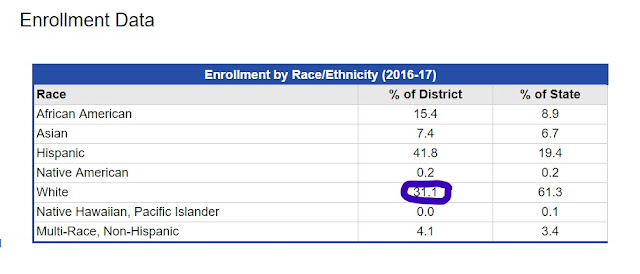I'll spoil the surprise and tell you that the top landing page continues to be the front page, 'though the percentage on that is down somewhat. I'll be interested in seeing if the option of getting an email each time there is a new post (see the left margin on a full screen version) will bring that down.
10. Not entirely surprising, considering how he dominated the news cycles this year, but tenth most viewed post this year was this post-inaugural post "Trump on education: myth busting". Setting the tone for much this year, the third line of that post is:
Both halves of this statement are false.9. My post on Worcester's preliminary election was the ninth most viewed post (in part because it ended up being promoted on social media). I'll of course be keeping a close eye on my new district councilor Matt Wally, who, along with Mayor Petty, the rest of the City Council and the School Committee are sworn in on Tuesday.
8. The December 4 post on how the federal tax bill could hurt school budgets was the eighth most viewed, and that will no doubt continue to be a topic of major concern since the terrible tax bill passed.
7. Demonstrating that there's no lack of interest in wonkish finance posts, the post from early July explaining hold harmless and minimum per pupil aid--and thus why chapter 70 could still be constitutionally cut for many communities--was the seventh most viewed. This didn't happen, and politically it's something of a third rail, but it's a good thing to understand about how many school districts are getting their increases in aid now.
6. The reason I didn't do this earlier in the week is I wanted somewhat valid results and I saw this one blowing up: the December 29th post on how the accountability system in changing in Massachusetts. Given more time, this would be higher. The weighing of that system is part of the January meeting of the Board of Education, so stay tuned.
5. My Wednesday-after-the-election post on what happened across Massachusetts in education is the fifth most viewed. One of the things I've had to adjust to in this job is how many races you end up following on election night: LOTS! The city school committees are being sworn in over the course of the next few weeks, as it happens.
4. Going back to the reset of accountability coming out of the federal education law, this April Board of Ed liveblog on the state's resetting of the accountability system was the fourth most-read. This is mainly, I believe, due to people looking for confirmation that this year was going to (for most elementary schools) be a year without levels, as it was.
3. Part of the explosion of resistance work has been passing things along on social media, which sometimes has drawbacks, which led to this post from February, taking apart one such "copy and paste" on federal education and giving specifics on what to watch, which is still true: CIVIL RIGHTS.
2. This August post about Worcester principals under the new administration--commenting that the persistent demand for a public process on principal appointments have vanished with the change in administration--was the second most read post.
1. And demonstrating that Boston can bring its size to bear even this far west, the most individually read post was "Clickbait" responding to a mess of an article from September that intimated that two dozen Boston schools were in danger of being declared underperforming this year, something all those who read number 4 knew wasn't the case.
What's up for 2018? January is going to be a lot: we've got the Governor's budget being released, a Board of Ed meeting that sets the balance in the accountability system, a new Commissioner being voted in, and (fingers crossed) Senate bill 224 on the foundation budget getting out of the Joint Committee on Education (Have you bugged anyone on that lately? Because this week, we start!).
And that, of course, is just January, but those four things will be where a lot of the state attention on schools are this year.
One thing I personally want to keep working on (spurred by my holiday reading) is a better understanding and knowledge of the history of public education in Massachusetts; you may see some of that come through on here.
No worries, though: I've gotten the message (both on and offline) that coverage and commentary from Worcester is needed and appreciated. The strategic plan is supposed to be released early next year, too, so we'll keep an eye on that, as well as Worcester's budget (below foundation no more?) and what other changes Worcester may or may not be up to.
Happy new year to you and yours, and, as I said over on Twitter earlier this week:
Also, I just want to say here that I dearly love that there are those of you interested in accountability updates and the history of desegregation, December 29 or no. #MAEdu— Tracy O'Connell Novick (@TracyNovick) December 29, 2017













